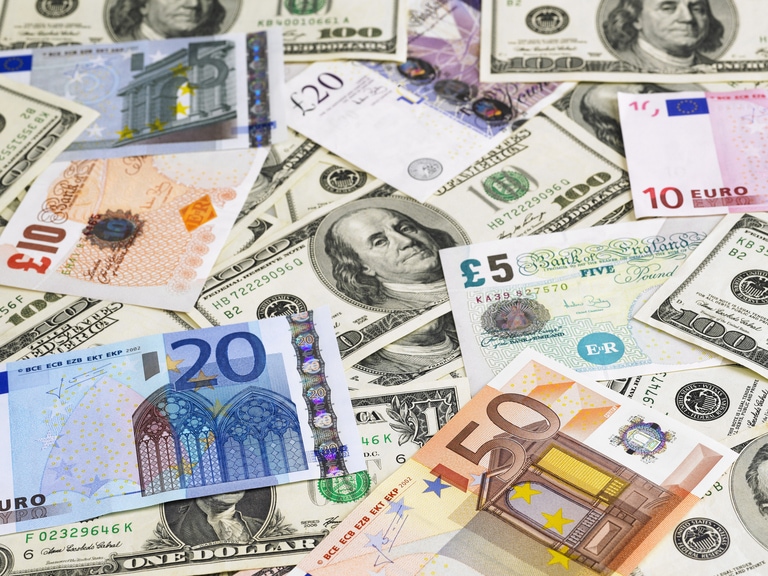European markets underwent another modestly negative session yesterday after US CPI for April dropped to 4.9% and a 2-year low, while core prices slipped back modestly, as expected to 5.5%.
US markets had a more positive bias, finishing the day higher, with the Nasdaq 100 leading the gains, and the Dow lagging as yields and the US dollar slid back. Yesterday’s inflation data was particularly welcome as it supported the narrative of a pause in the Fed’s rate hiking cycle at the next meeting.
Today’s April PPI numbers could well reinforce that narrative further, if they continue to slow at the pace we’ve seen in the past few months. Since the end of last year PPI has fallen from 6.2% in December to 2.7% in March and is expected to slow further to 2.5% today.
Core PPI has been slightly stickier but has also slowed from 5.8% in December to 3.4% in March and is expected to come in at 3.3%. As a leading indicator for CPI this should lend support to the idea that inflation has further to fall, however it still doesn’t mean that the Fed will be inclined to cut rates as soon as this year, especially with a resilient labour market and wages growth trending at current levels.
Today’s weekly jobless claims are expected to remain steady at 245k.
Before today’s US data the Bank of England is due to meet and raises rates for the 12th meeting in a row.
At the start of this year, the Bank of England, along with several other notable institutions were predicting a dire year for the UK economy. From the World Bank, the IMF, and the OECD all were unanimous in their warnings of doom and gloom, with the IMF predicting a contraction of -0.6% for this year, although this was quickly revised to -0.3% in April.
In February, the Bank of England followed suit, predicting a -0.7% contraction by the end of this year compared to last year, while predicting a shorter and shallower recession than predicted in November. On inflation the predictions were for a sharp fall to about 4% by the end of this year, returning to target in about 12 months from now.
It’s become abundantly clear over the last few months, that the Bank of England’s stewardship of monetary policy over the last 12 months has been questionable to say the least, with no hint of self-reflection or introspection, from any on the MPC.
From tone-deaf utterances from the likes of Bank of England governor Andrew Bailey about the risk of asking for higher wages, and his chief economist Huw Pill, who recently said that UK consumers would have to get used to a lower standard of living because of persistently high levels of inflation, or risk rates staying higher for longer, there has been little sign of any admission of a policy failure on the banks part.
With wages slowly starting to play catchup with headline CPI in various parts of the country, its highly likely we will see another 25bps rate hike today, albeit on a split vote, with headline CPI still above 10% and core prices at 6.2%, with the potential that we might see a further 25bps during the summer, although for now that remains an outlier, with the very real prospect that we could be at the end of the rate hiking cycle, or at least very close to it.
Much will depend on how much of a fall we see when the April and May CPI numbers are released over the next few weeks, when base effects kick in and the energy price cap rolls off, but the fact remains that if the Bank of England hadn’t been asleep at the wheel when it became apparent that inflation was starting to accelerate at the end of 2021, inflation may well not be as high, or as entrenched as it is now.
Of course, we will never know what the counterfactual would have been but if rates had matched the pace of the US Federal Reserve, but there is a chance, we might be a lot nearer to the prospect of cutting rates than we are now.
Under current conditions, and with wage growth in some areas of the country rising at 10% or more, it’s hard to see rates coming down much before the middle of next year, which is bad news for those who are about to come off fixed rate mortgages.
The Bank of England will also update us with their latest updated projections for inflation, as well as their view on the outlook for the UK economy, with GDP expected to be revised up, although as with most of their predictions they will probably end up being wrong.
Nonetheless we should get a decent idea of their thinking when it comes to their expectations for further rate increases, which are likely to lean towards the dovish side. Bank of England governor Andrew Bailey does have form for talking the economy and sterling down after hiking rates. It's unlikely today will be any different.
We’ve certainly come a long way from their bleak outlook of the worst recession since the 1930’s at which was being predicted at the end of last year.
EUR/USD – continues to find support at the 1.0940 area, with the recent highs just below 1.1100 continuing to cap the upside. A break above 1.1120 is needed to signal further gains towards 1.1200. A break below 1.0940 retargets the 1.0870 level.
GBP/USD – pushed up to a new 12-month high at 1.2679 yesterday with next resistance at 1.2756 which is 61.8% retracement of the 1.4250/1.0340 down move. Support now at 1.2530.
EUR/GBP – slipped to 0.8667 yesterday with support down at the 0.8640 area We now have resistance at the 0.8730 area and the 200-day SMA. We need to see a recovery back above 0.8760 to stabilise and signal a return to the 0.8820 area.
USD/JPY – yesterday’s sharp fall from the 135.50 area could see us fall back towards the 133.50 lows from last week. This needs to hold to keep the upside towards 136.20 or risk a move back towards 132.00.






